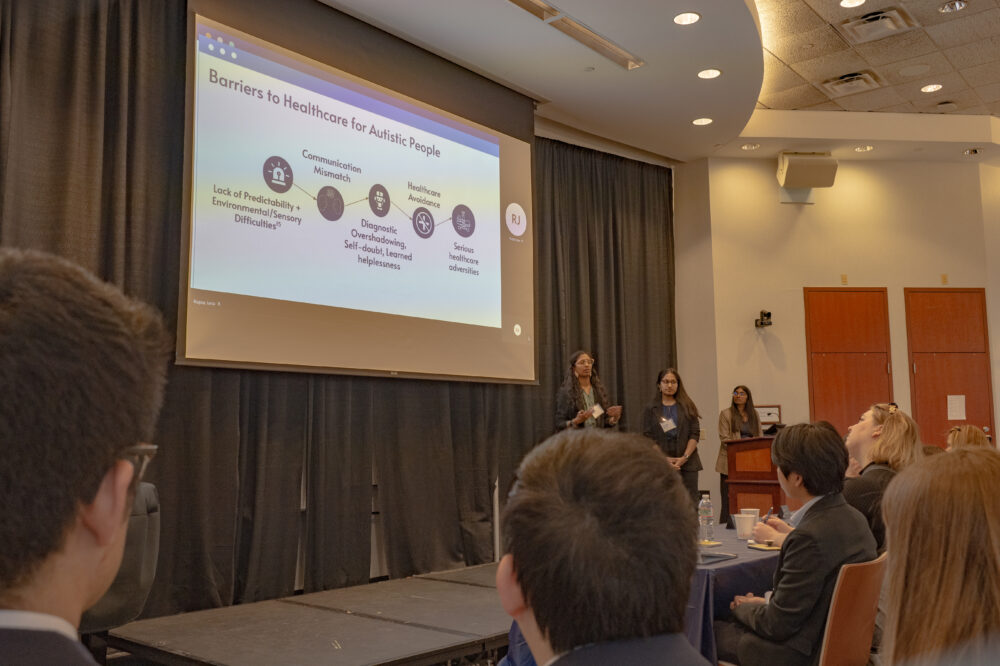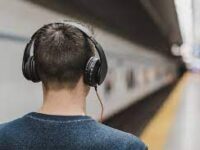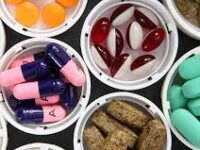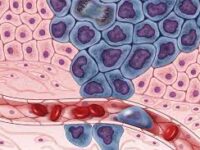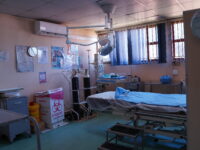Roughly 3 in 4 autistic adults report having difficulty when visiting a healthcare provider. One Northeastern club is looking to change that.
At this year’s Husky Health Innovation Challenge, or HHIC, students generated digital solutions to healthcare communication issues faced by those on the autism spectrum, ranging from role-playing apps to wearable technology that tracks stress events.
The annual challenge is hosted by ViTAL, Northeastern’s healthcare innovation club, and tasks students with developing a concept for a digital solution and a full-scale business plan for a provided case topic. This year was focused on autistic individuals, but prior challenges have tasked students with coming up with solutions to gut-brain disorders, pediatric caregiver burden, and geriatric nutritional modeling.
This year, the competition drew in 80 students across 33 teams, the most the challenge had ever received, according to HHIC director Rupsa Jana, a third-year biochemistry student. In the end, the HHIC organizing team selected four proposals to be judged by a panel of healthcare professionals and autism advocates at the challenge’s final pitch day, which took place on Feb. 24 at the Raytheon Amphitheater in Northeastern’s Egan Research Center.
For some teams, the challenge struck a personal note. First-year behavioral neuroscience and data science student Noa Yiddiah was inspired to join the competition after seeing her older brother Gilad, who has autism, struggle with anxiety over doctor’s appointments.
“I was a part of ViTAL and interested in the innovation aspect,” Yiddiah said. “Then I came to the first meeting, and it was something I had knowledge with.”
She joined forces with first-year biology student Alaina Fernandes and first-year behavioral neuroscience student Riya Kadakia to create the app Med2Care, which placed second in the challenge. Med2Care takes a three-pronged approach to aiding autistic patients in healthcare settings. It helps users prepare for an appointment, communicate during the visit, and locate a medical professional who understands the accommodations they may need.
Creating the proposal wasn’t always easy for the team of first-year students. None of the members had a background in computer science or technology, which made it difficult to understand how to implement the AI features they wished to integrate into their app.
” ‘I was a part of ViTAL and interested in the innovation aspect,” Yiddiah said. “Then I came to the first meeting, and it was something I had knowledge with.’ “
“We had to do a lot of research on AI to know about the regulations,” said Kadakia.
For the team behind the winning project — Tour Guide at the Hospital, or TaLIAH for short — the most difficult element of the challenge was finding the time to squeeze another task into their busy schedules.
“We just spent many, many late nights together,“ said third-year bioengineering student Kaitlyn Ramesh. She created TaLIAH with her roommate, third-year behavioral neuroscience Janani Elumalai.
TaLIAH is an app that educates users on the healthcare process to allow for preparation and consideration before appointments. It allows users to view a step-by-step guide on their visit, highlighting instruments that may be used during appointments.
At each step, the app also points out aspects of the facility that may be hard for those who have sensory difficulties and prompts users to reflect on how they might advocate for their sensory needs by presenting different phrases they could use to request an accommodation. For example, the app describes that the material of a hospital gown may be uncomfortable and prompts the user with a way to ask for a different option.
Following their win, the team behind TaLIAH is looking into ways to expand their project after the challenge. “We’re definitely not closing any doors yet, ” said Ramesh.
